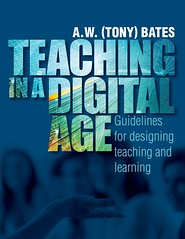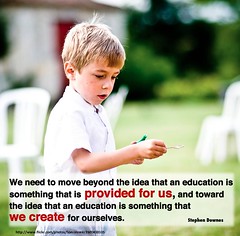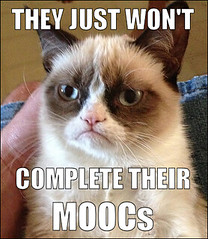 |
|
by planeta
|
Musings on the Readings...
What does it mean to be Teaching in a Digital Age? Is it about the Open Education or Open Learning Movement, where learning is for anyone who has wifi connection, and even textbooks (from authors like Tony Bates), are made free?! Is it one where the teacher is obsolete and has been replaced by a screen and personalized learning software? Or is it a place where there are no teachers, only experts that students Skype and learn from?
When we think digital age, these are sometimes some of the futuristic notions that may come up. Many notions of learning in the digital age all revolve around the technology - the devices, the apps or the software. But instead it should focus on the pedagogy or the learning opportunities amplified or made possible because of the technology.
When I consider the impact of technology on my own learning, immediately I think of courses such as this one. Online and blended learning have definitely been a benefit in my life. Fortunately I live in Regina and even close to the university, but it is so much nicer to be able to learn while enjoying the comfort of my couch!
These are the benefits of blended learning in my life, but I am also a self-motivated, adult learner. Going through the readings, I wondered about how the approach in blended in online learning would be different for middle years students or even primary students. As I was perusing other blogs from our #ECI834, it became evident, that others have wondered the same thing.
Amy Singh in her post, "What's in a Learning Management System" had considered the same issue regarding online learning beyond adult learners, and states, "As an adult, the online format is easier for me to balance my life, and it also works for me because I’m a motivated learner – does the same hold true for our ‘youngest’ learners?" She and Nicole Reeve (Blended Learning in a Primary Classroom: Is it Possible) intend on a blended learning project incorporating science for elementary students. I admire their initiative and courage to design this. And yes, I say courage, as I admire any teacher who is willing to take a risk to try something completely new - particularly a blended personalized course for primary students!
On Personalized and Personal Learning...
Although I have had some experience as a student of online learning, Stephen Downes' article on Personal and Personalized Learning got me thinking about approaches to learning in general, with or without technology.Immediately when you learn about personal learning you start to think of Student Driven Inquiry (SDI) models such as Genius Hour. Over the last couple years, I have done a lot of research and exploration of student driven inquiry models. The benefits of this approach to learning are extremely important in helping students to become passionate and engaged life long-learners, who understand how they learn best, and have developed the critical thinking and problem solving skills. The basic constructivist philosophy behind SDI is in alignment with Downes' statement that the role of teachers should be to support learning not provide it... as learning is not something which can be poured into a student. SDI also is in agreement with Downes' issue that the learner needs to have control over "what to learn, how to learn, and where to learn".
 |
|
(CC BY-NC 2.0) by D. shareski
|
Yes, technology can help with differentiating learning according to student needs and interest. But where to begin? The software and devices for differentiating learning are only one piece of the puzzle. What about the training of the teachers in supporting every student's personalized program? What about curriculum? Outcomes??
What's All This About MOOCs?
Have schools instead elected to explore and implement personalized learning because it's easier than a totally differentiated, personal approach? The Massive Open Online Course (MOOC) might be that next step towards personal models.
MOOCs - a space where teachers can model and structure a framework for exploring content. But the learning happens, when the participants engage and connect with one another, then reflect on the experience.
 |
| "Grumpy MOOC cat"(CC BY-NC-ND 2.0)
by ryan2point0
|
Tony Bates questions, are universities truly ready for blended learning? Are some online courses, such as in some MOOC courses, still trying to take a traditional approach learning and forcing it into an online course?
 |
|
Remixed by Jennifer Stewart-Mitchell, 2017
|
Hmmm... Lots of things to consider. Perhaps this goes to show us that, everything that is old, is new again... even when we are talking about the digital age.
Hey Jenn! Great post and great thoughts about the readings and MOOCs especially. In short, yes, tons of MOOCs are basically a canned course that assumes content can be downloaded to participants. In some you can't even do assignments unless you pay. There are, however, different types of MOOCs (xMOOCs and cMOOCs). The xMOOCs are the standard "here are your videos and readings now go do them" and cMOOCs are community-based so the purpose is to have participants build communities. etmooc is one of those, as is DS106, both of which are huge and have drawn a lot of people in. Bates only sort of touched on who takes MOOCs but his analysis is sort of lacking in critical theory. A good post to check would be something from Audrey Watters, like this: http://kernelmag.dailydot.com/issue-sections/headline-story/14046/mooc-revolution-uber-for-education/. Mostly, it's educated white people who are fairly privileged and thus have time to take MOOCs. It isn't opening education, it isn't people whose lives might improve by taking it. Universities use them as advertising. There are some that have been awesome but, to be honest, I've never really managed to participate in one. I have lots going on and if I want to learn something, I can find other ways to do it than taking a course that isn't a course but is often just the boring parts. So something to consider.
ReplyDeleteThanks so much for commenting Kirsten! I will be sure to check out Audrey Watters' post. In a previous Couros/Hildebrandt class we had her as a guest onlin lecturer, and I recall that she was quite interesting. I haven't explored the difference between the different types, so I appreciate you taking the time to share! I had wondered if MOOCs were just advertising for the universities, as there are often just one or two represented for a particular university. Ah Siemens and Downes would be dismayed to see things go this way for the MOOC.
ReplyDeleteHey Jenn, this is a great post. When I think about my own project, I have so many ideas in my head but need to think of practical ways to put them into action. Your post helped make things more clear!
ReplyDeleteMy guess would certainly be that student interactivity with each other would definitely increase retention and completion although I believe our motive would be more around creating the environment for deeper learning à la Bandura, Vygotsky, Lave, Wenger, Illich, Siemens, etc. via the development of community, learning webs, PLNs, communities of practice and other rich learning environments. Thanks for the great post!
ReplyDeleteExcellent blogs!!!!you have for sharing them effect information..we developer very learning to easy.
ReplyDeletePersonalized Learning software